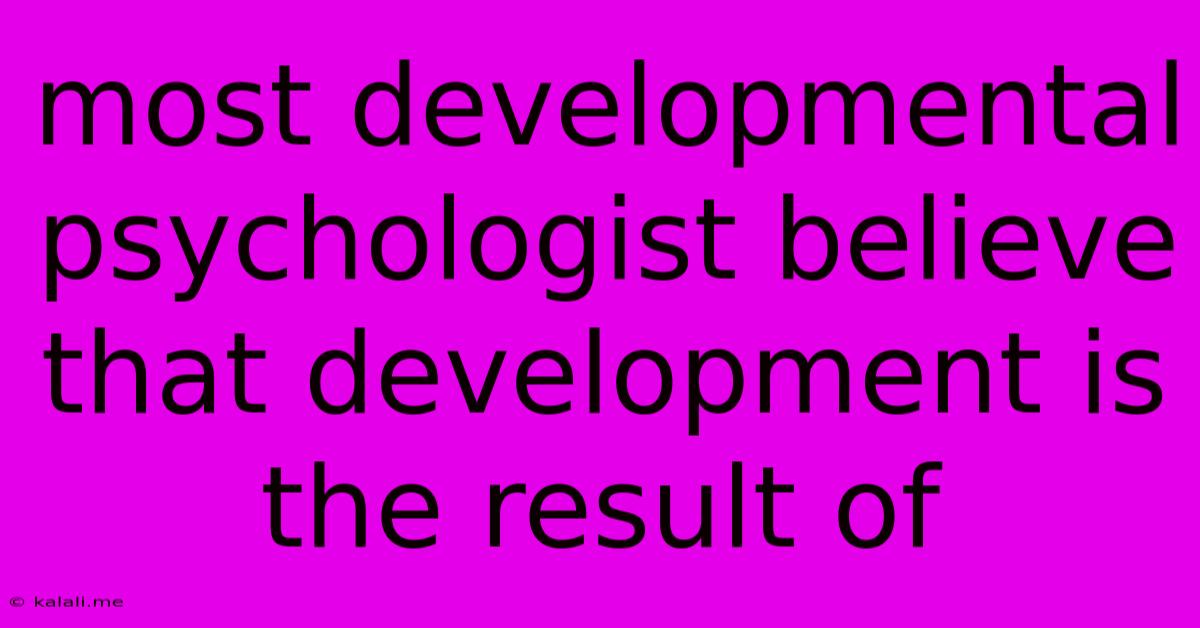Most Developmental Psychologist Believe That Development Is The Result Of
Kalali
Jun 12, 2025 · 3 min read

Table of Contents
Most Developmental Psychologists Believe That Development Is the Result of: Nature, Nurture, and Their Interplay
Developmental psychology is a fascinating field exploring the intricate processes that shape human beings from infancy to old age. A central question in this field is: what drives development? While there's no single, universally accepted answer, most developmental psychologists believe development is a complex interplay of nature (genetics) and nurture (environment). This article will delve into this nuanced perspective, exploring the contributions of both factors and their dynamic interaction.
Understanding the Nature vs. Nurture Debate
For a long time, the field was dominated by a simplistic "nature versus nurture" debate. The nature side emphasized the role of inherited genes in determining traits, abilities, and behaviors. The nurture side, conversely, highlighted the influence of environmental factors like parenting styles, socioeconomic status, cultural experiences, and education.
However, modern developmental psychology largely rejects this binary view. The current consensus recognizes that development is not an "either/or" proposition but rather a complex "both/and" interaction. Genes and environment constantly interact and influence each other in intricate ways.
The Role of Nature (Genetics): The Blueprint of Development
Our genetic inheritance provides a foundational blueprint for development. Genes influence a wide array of characteristics, including:
- Physical traits: Height, weight, eye color, and predisposition to certain diseases.
- Temperament: Innate personality characteristics such as sociability, activity level, and emotional reactivity.
- Cognitive abilities: Genetic factors contribute to variations in intelligence, learning styles, and cognitive processing speed.
- Susceptibility to mental health disorders: Genetic predisposition plays a significant role in the development of conditions like depression, anxiety, and schizophrenia.
The Role of Nurture (Environment): Shaping the Expression of Genes
While genes provide the initial blueprint, environmental factors play a crucial role in shaping how those genes are expressed. These environmental influences include:
- Prenatal environment: Factors like maternal nutrition, exposure to toxins, and stress levels during pregnancy can significantly impact fetal development.
- Parenting styles: The quality of parent-child interactions, attachment security, and parenting practices profoundly influence emotional development, social skills, and self-esteem.
- Socioeconomic status: Access to resources, quality of education, and exposure to stressors are strongly linked to cognitive development, academic achievement, and overall well-being.
- Cultural context: Cultural values, beliefs, and practices shape social norms, behavioral expectations, and cognitive frameworks.
- Peer influences: Interactions with peers significantly impact social development, identity formation, and risk-taking behaviors.
The Interplay of Nature and Nurture: Epigenetics and Gene-Environment Interactions
The most compelling evidence points to the continuous interplay between nature and nurture. This interaction is highlighted by the field of epigenetics, which studies how environmental factors can modify gene expression without altering the underlying DNA sequence.
For example, chronic stress can alter gene expression, impacting vulnerability to various health problems. Similarly, enriching environments can stimulate brain development and enhance cognitive abilities, potentially overcoming genetic predispositions. This highlights the dynamic and bidirectional nature of gene-environment interactions.
Conclusion: A Holistic Perspective on Development
In conclusion, most developmental psychologists agree that human development is a multifaceted process shaped by the intricate interplay of nature and nurture. Understanding this interaction requires a holistic approach that considers both genetic predispositions and the powerful influence of environmental factors throughout the lifespan. Future research will continue to unravel the complex mechanisms underlying this dynamic interplay and its impact on various aspects of human development.
Latest Posts
Latest Posts
-
Math Formulas To Know For Act
Jun 13, 2025
-
A Coin Is Tossed 3 Times
Jun 13, 2025
-
What Are All The Factors For 50
Jun 13, 2025
-
77 77 77 Divided By 0
Jun 13, 2025
-
Surface Tension Of Water At 20 Degree Celsius
Jun 13, 2025
Related Post
Thank you for visiting our website which covers about Most Developmental Psychologist Believe That Development Is The Result Of . We hope the information provided has been useful to you. Feel free to contact us if you have any questions or need further assistance. See you next time and don't miss to bookmark.